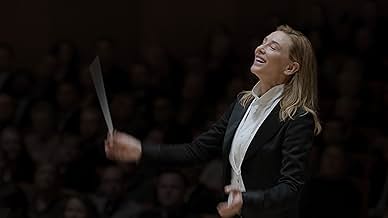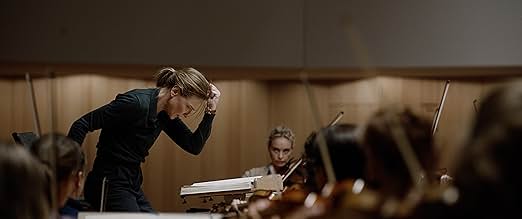Set in the international world of Western classical music, the film centers on Lydia Tár, widely considered one of the greatest living composer-conductors and the very first female director ... Read allSet in the international world of Western classical music, the film centers on Lydia Tár, widely considered one of the greatest living composer-conductors and the very first female director of a major German orchestra.Set in the international world of Western classical music, the film centers on Lydia Tár, widely considered one of the greatest living composer-conductors and the very first female director of a major German orchestra.
- Nominated for 6 Oscars
- 80 wins & 273 nominations total
Zethphan D. Smith-Gneist
- Max
- (as Zethphan Smith-Gneist)
Alec Baldwin
- Alec Baldwin
- (voice)
- Director
- Writer
- All cast & crew
- Production, box office & more at IMDbPro
Storyline
Did you know
- TriviaCate Blanchett had to re-learn the piano, learned how to speak German, and learned how to conduct an orchestra for the film.
- GoofsWhen Lydia is talking to the two technicians after a rehearsal in Berlin, she requests they send her audio and video recordings, but the console in front of them in the booth is actually for controlling lights, not audio/video.
- Crazy creditsThe opening credits presents the film crew and acknowledgments (usually shown at the end titles) without presenting the actors. The actors and soundtrack are shown at the ending without the crew.
- ConnectionsEdited from Dự Án Phù Thuỷ Blair (1999)
- SoundtracksDas Wohltemperierte Klavier: Präludium and Fuge C-Dur, BWV 846
Written by Johann Sebastian Bach
Piano, Cate Blanchett
Featured review
During the first minute of this film, Cate Blanchett shows what an extraordinary actress she is. Her character, star conductor Lydia Tár, is waiting to go onstage. There is no dialogue, only body language. But even without words, Blanchett shows what Tár thinks and feels.
Blanchett's remarkable performance is a large part of what makes this a good movie. But there's more. The very clever script gives us a lot to chew on afterards. Tár is a woman in the men-dominated world of classical music. She's not warm, empathic or even very sympathetic. In fact, she has many characteristics that are usually associated with men. She's vain, selfish and manipulative. And that's what gets her in trouble. At the start of the film, she seems to be one of the most admired women in the world. She is extremely famous and successful. At the end, everything has fallen apart.
The film doesn't judge. It leaves it up to the viewer to decide if Lydia Tár is a victim or a culprit. Or maybe both at the same time. The viewer gets a lot of information to make up his (or her) mind. Director Todd Field gives us the story elements slowly, bit by bit. Take the scene where Lydia Tár gives a stern speech to a young girl who bullies her daughter. It shows that she is used to getting everyone in line, according to her wishes. That's useful information to interpret things later on in the movie.
Tár is very much a modern movie. It has things to say about gender, about power, about social media, about being woke. But at the same time, it's a very old-fashioned movie. It takes its time. There are long scenes, and long takes. There's nothing modern in the way it is filmed. And that's a good thing.
Blanchett's remarkable performance is a large part of what makes this a good movie. But there's more. The very clever script gives us a lot to chew on afterards. Tár is a woman in the men-dominated world of classical music. She's not warm, empathic or even very sympathetic. In fact, she has many characteristics that are usually associated with men. She's vain, selfish and manipulative. And that's what gets her in trouble. At the start of the film, she seems to be one of the most admired women in the world. She is extremely famous and successful. At the end, everything has fallen apart.
The film doesn't judge. It leaves it up to the viewer to decide if Lydia Tár is a victim or a culprit. Or maybe both at the same time. The viewer gets a lot of information to make up his (or her) mind. Director Todd Field gives us the story elements slowly, bit by bit. Take the scene where Lydia Tár gives a stern speech to a young girl who bullies her daughter. It shows that she is used to getting everyone in line, according to her wishes. That's useful information to interpret things later on in the movie.
Tár is very much a modern movie. It has things to say about gender, about power, about social media, about being woke. But at the same time, it's a very old-fashioned movie. It takes its time. There are long scenes, and long takes. There's nothing modern in the way it is filmed. And that's a good thing.
- How long is Tár?Powered by Alexa
Details
- Release date
- Country of origin
- Official sites
- Languages
- Also known as
- Tar
- Filming locations
- Dresden, Saxony, Germany(Kulturpalast & Großen Garten Platz)
- Production companies
- See more company credits at IMDbPro
Box office
- Budget
- $25,000,000 (estimated)
- Gross US & Canada
- $6,773,650
- Opening weekend US & Canada
- $158,620
- Oct 9, 2022
- Gross worldwide
- $29,048,571
- Runtime2 hours 38 minutes
- Color
- Sound mix
- Aspect ratio
- 2.39 : 1
Contribute to this page
Suggest an edit or add missing content



































